#2022 Russian Nationals
Text
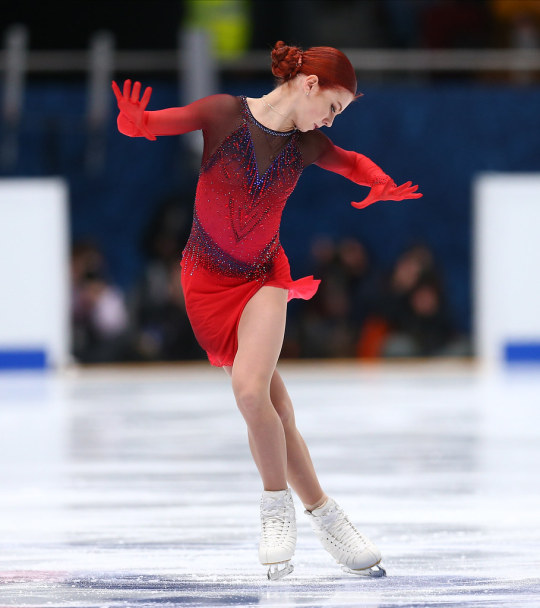

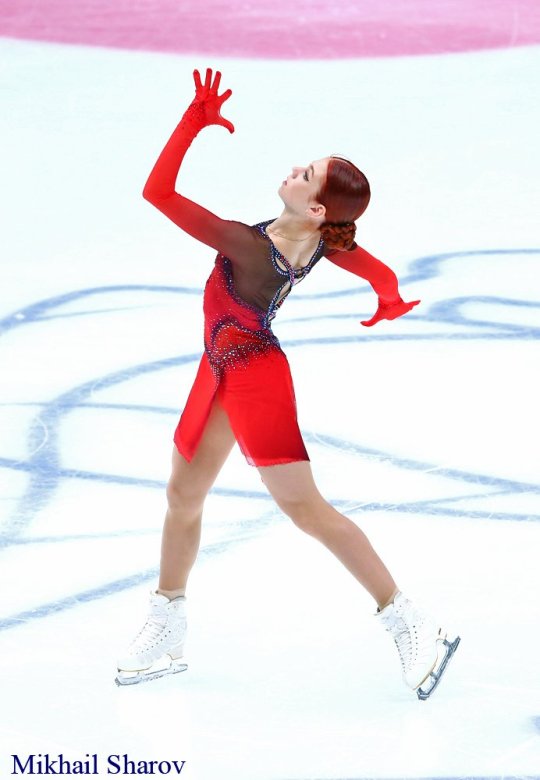

Alexandra Trusova's Frida costume at the 2022 Russian Nationals.
(Sources: 1 and 2)
#Alexandra Trusova#Figure skating#Russia#Frida#Elliot Goldenthal#2022 Russian Nationals#2021–2022#Women
36 notes
·
View notes
Text
She's so funny, I love her 😭😂
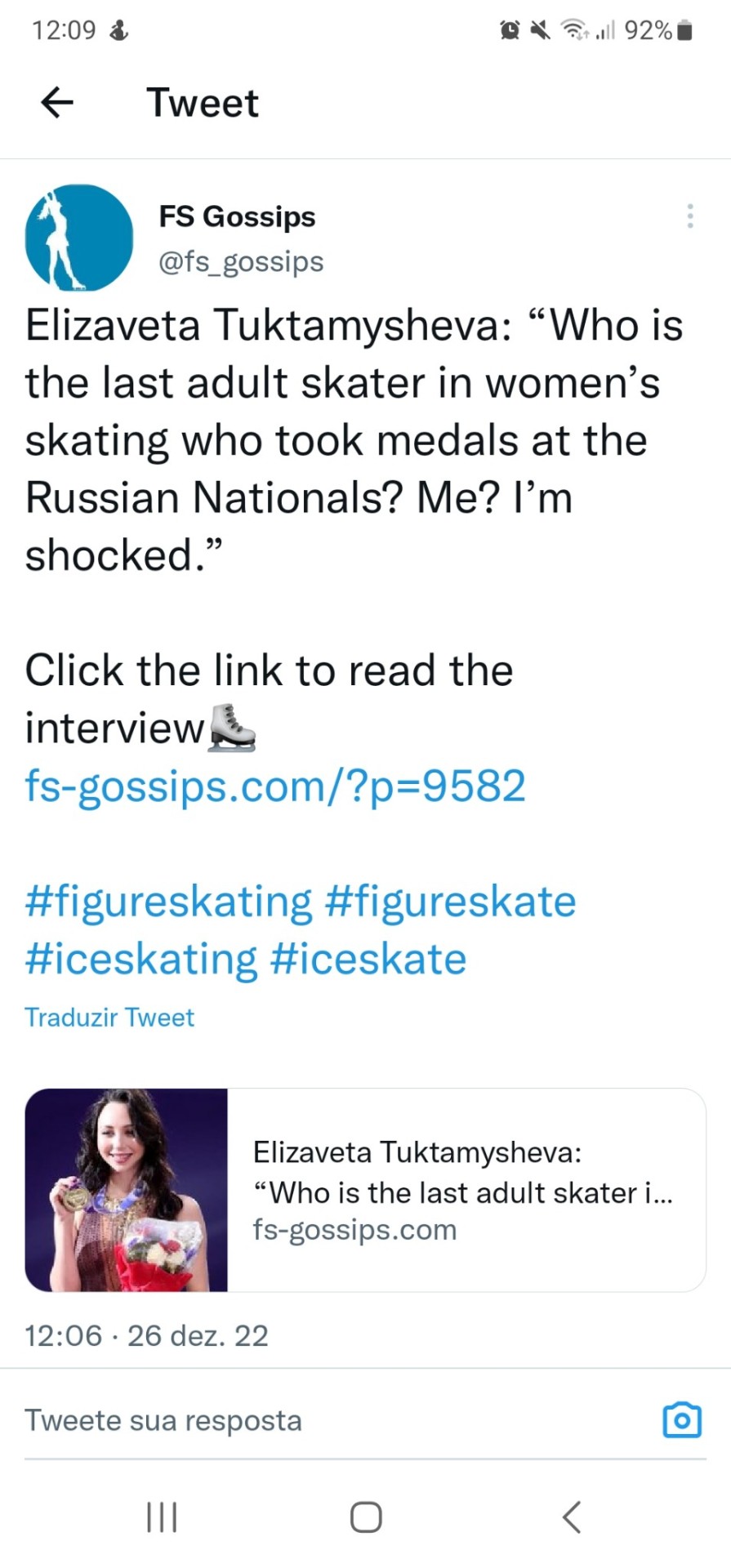
#figure skating#russian figure skating#russian nationals#russian nationals 2022#elizaveta tuktamysheva#she came third btw#im so happy for her#my empress!!!#💜💜💜💜
43 notes
·
View notes
Text

Melitopol // Ukraine
#2022 russo ukrainian war#2022 Invasion of Ukraine#russo ukrainian war#russo ukrainian crisis#Melitopol#Ukraine#Russia#Russian Forces#Russian National Guard#FSVNG#Rosgvardiya#AK-74#Zaporizhzhia Oblast#Zaporizhzhia#Kalashnikov#gunblr#milblr#AK-74M#military#rifle#armed forces#gun community#russian forces
91 notes
·
View notes
Text
why (and i cannot stress this enough) the fuck is a country whose soldiers beheaded a prisoner of war on camera permitted to remain a member of the UN, let alone a permanent member of the UN Security Council. jesus fucking christ.
#toaster thoughts#serious post#violence tw#dismemberment tw#war tw#united nations#russia#ukraine#russo ukrainian war#russian invasion of ukraine (2022)#i want to break something. fuck man
10 notes
·
View notes
Quote
An estimated 14 per cent of all food produced for human consumption is lost before it even reaches consumers. Food waste is happening as the number of hungry people worldwide rose to 828 million in 2021, or 46 million more than in the previous year. In 2020, nearly 3.1 billion people could not afford a healthy diet, up 112 million from 2019, as the impacts of the COVID-19 pandemic drove up inflation. This year, the war in Ukraine has threatened global food security.
‘Sustainable food cold chains reduce waste, fight climate change: UN report’, United Nations
10 notes
·
View notes
Text
StEx Appreciation Month Day Twenty-Five: National Engines



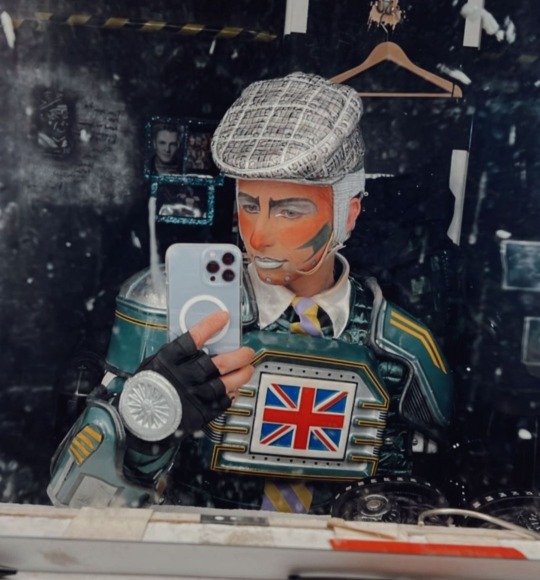
Favorite Actor: (Just for my faves, cause I don’t think about the Nationals as often)
Espresso: Gary Sheridan
Brexit: Kevin Kohler
Turnov: Luke Dowling
Ruhrgold: Cole Dunn
Favorite Song/Scene: Their introductions, them racing, and that lovely moment in the megamix now where they all wave their flags :)
Favorite Costume: I love Espresso’s update costume! Bobo being orange makes a lot more sense, the Japanese Engine looks the best and most accurate in the update as Manga as well. Ruhrgold being the white, red, and blue ICE design is perfection.
Favorite Ship: BoboxEspresso, Ruhrgold/Carrie or Joule
Headcanon: Exchanging phrases in their different languages is always something they have fun with every year at the championship races
Unpopular Opinion: Uhhh, not sure I have any? Other than I really prefer Ruhrgold over Weltschaft? For obvious reasons...also the only British engine I care about is Brexit, sorry
#starlight express#stex appreciation month 2022#stex appreciation month#national engines#nationals#espresso the italian engine#brexit the british engine#turnov the russian engine#coco the french engine#bobo the french engine#manga the japanese engine#ruhrgold the german engine
4 notes
·
View notes
Quote
Elon Musk’s company SpaceX is a U.S. defense contractor, with billions of dollars in Pentagon contracts. That makes his intervention to thwart Ukrainian military operations a U.S. national security concern, not only because America supports Ukraine’s self-defense against Russia’s invasion, but also because it suggests the U.S. military may have left itself open to similar disruptions.
Excerpts from biographer Walter Isaacson’s book, Elon Musk, show Musk denying Ukraine Starlink internet access off the coast of Crimea in Sept. 2022, causing Ukrainian sea drones to stop functioning. A private citizen thwarting an in-progress military operation like this is unprecedented.
[...]
Congress should exercise its oversight powers and look into both SpaceX’s actions in Ukraine and the extent of American dependence on Musk’s company.
At minimum, it’s an information security risk.
Isaacson says Musk texted him about the Ukrainian sea drones headed to Crimea as he was trying to decide what to do. No one should be telling journalists about secret military operations as they’re happening.
Elon Musk especially shouldn’t be in position to, given his direct contact with foreign officials, and his apparent affinity for online trolls, including contributors to Russian state media outlet RT.
He’s free to associate with whomever he wants, and to express his opinions about the war (even if he doesn’t know what he’s talking about and has vast means to spread his thoughts widely).
But a defense contractor controlled by one volatile personality, who is at best ignorant of international power politics and susceptible to Russian propaganda, and does not respect that national security decisions are up to governments rather than him personally, is not someone the United States should consider a reliable business partner.
U.S. Government Can’t Allow Elon Musk the Power to Intervene in Wars
1K notes
·
View notes
Text
”Ukraine’s parliament has voted through two laws that will place severe restrictions on Russian books and music as Kyiv seeks to break many remaining cultural ties between the two countries following Moscow’s invasion.
One law will forbid the printing of books by Russian citizens, unless they renounce their Russian passport and take Ukrainian citizenship. The ban will only apply to those who held Russian citizenship after the 1991 collapse of Soviet rule.
It will also ban the commercial import of books printed in Russia, Belarus and occupied Ukrainian territory, while also requiring special permission for the import of books in Russian from any other country.
Another law will prohibit the playing of music by post-1991 Russian citizens on media and on public transport, while also increasing quotas on Ukrainian-language speech and music content in TV and radio broadcasts.
The laws need to be signed by president Volodymyr Zelenskiy to take effect, and there is no indication that he opposes either. Both received broad support from across the chamber on Sunday, including from lawmakers who had traditionally been viewed as pro-Kremlin by most of Ukraine’s media and civil society.
Ukraine’s culture minister, Oleksandr Tkachenko, said he was “glad to welcome” the new restrictions.
“The laws are designed to help Ukrainian authors share quality content with the widest possible audience, which after the Russian invasion do not accept any Russian creative product on a physical level,” the Ukrainian cabinet’s website quoted him as saying.
The new rules are the latest chapter in Ukraine’s long path to shedding the legacy of hundreds of years of rule by Moscow.
Ukraine says this process, previously referred to as “decommunisation” but now more often called “derussification”, is necessary to undo centuries of policies aimed at crushing Ukrainian identity.
Moscow disagrees, saying Kyiv’s policies to entrench the Ukrainian language in day-to-day life oppress Ukraine’s large number of Russian speakers, whose rights it claims to be upholding in what it calls its “special military operation”.
This process gained momentum after Russia’s 2014 invasion of Crimea and support for separatist proxies in Ukraine’s Donbas, but took on new dimensions after the start of the full-scale invasion on 24 February.
Hundreds of locations in Ukraine’s capital, Kyiv, have already been earmarked for renaming to shed their associations with Russia, and a Soviet-era monument celebrating the friendship of the Ukrainian and Russian people was torn down in April, eliciting cheers from the assembled crowd.”
- Luke Harding, Reuters in Kyiv, “Ukraine restricts Russian books and music in latest step of ‘derussification’,” The Guardian. June 20, 2022.
////
Oleksandra Koval, director of the Ukrainian Book Institute (part of the Ukrainian Ministry of Culture), has claimed that they will begin working towards withdrawing over 100 million so-called ‘propaganda’ books from public libraries in Ukraine. The books – including the works of the world-renowned writers and poets Dostoyevsky and Pushkin – may be sent to paper recycling centres according to the Minister of Culture and Information Policy, Oleksandr Tkachenko.
The first round of withdrawals, which Koval expressed a desire to complete by the end of the year, will target what she called in an interview with Interfax Ukraine, “ideologically harmful literature” published when Ukraine was a part of the Soviet Union, as well as Russian literature with so-called “anti-Ukrainian content”. The second round of withdrawals is intended to include all books published in Russia since the collapse of the Soviet Union: “they will probably be of different genres, too, including children’s books, and romance novels, and detective stories,” Koval explained.
After the disposal of such ‘harmful’ literature, Ukrainian Public and School libraries will be left with about 100 million books, or half of their current total volume, according to Koval’s estimate. But not all copies of Russian books ought to be removed, says Koval: some should be kept in university and scientific libraries, where Soviet-era children’s fairy tales and romance novels will be preserved “for specialists to study the roots of evil and totalitarianism”.
The removal of Russian books must be seen in the greater context of the ‘decommunisation’ of Ukraine. Since 2015, all communist parties and symbols have been banned, and the war has only been used to further ramp up political repression: the Zelensky regime has banned another eleven parties, and has placed all TV stations under government control.
This is not the first time in recent years Russian books have been banned by the Ukrainian government. In 2015, 38 books published in Russia were banned. More books have been added to the list since, including two books by the popular contemporary Russian detective-novel author, Boris Akunin, and a memoire of the beloved Soviet actor and musician Vladimir Vysotsky.
In 2018, the Russian language edition of ‘Stalingrad’ by British historian Antony Beevor was banned, although the ban was later lifted due to pressures from the British embassy. The reason for the ban? A passage describing the murder of 90 Jewish children by the Organisation of Ukrainian Nationalists, of which Nazi collaborator Stepan Bandera was a leading figure.
In 2018 a Russian language book describing the murder of 90 Jewish children by Nazi collaborator Stepan Bandera was banned / Image: Picasa Gallery, Wikimedia Commons
This is the same Bandera who in 2021 was honoured by the Ukrainian Institute of National Memory through inclusion in a ‘Virtual Necropolis’ commemorating important historical figures – alongside two commanders of SS battalions (Smovsky Konstantin Avdiyovych, deputy commander of the 118th Battalion of the Schutzmannschaft and Ivan Omelianovycha-Pavlenko, commander of the 109th Schutzmannschaft) who carried out pogroms against Jews! But monuments to Stepan Bandera are not limited to the virtual realm. In recent years statues have been constructed in honour of the pogromist, while statues of Lenin and Pushkin have been torn down. And in Chernihiv, a monument to the Soviet partisan and anti-fascist martyr Zoya Kosmodemyanskaya was demolished.
On 21 May, a picture was shared on social media allegedly showing the burning of Ukrainian history books, organised by Russian forces. This image was given wide circulation by the British ambassador to Ukraine, as well as the ex-prime minister of Sweden, Carl Bildt (who, among other shady dealings, has been implicated in war crimes in Sudan as a member of Lundin Group’s board of directors).
The picture was later proven by the France24 fact checking site ‘the Observers’ to have been taken during a protest in Crimea in 2010. Regarding whether the Russian forces have generally engaged in the destruction of books, the France24 article goes on to say that “Ukrainian authorities have claimed that Russian soldiers have destroyed books in the occupied areas… However, our editorial staff did not find any photos showing this destruction.”
It is hardly novel for governments to crack down on free speech in times of war. But this attack is just the latest of many attacks against the status of the Russian language in Ukraine that long precede this war. One third of Ukrainians regard Russian as their native tongue. Yet in 2017, a law was tabled stating that Ukrainian must be the language used at all levels of education, with Russian and other minority languages only recognised for instruction at pre-school and primary school levels. Before his election in 2019, Zelensky had promised to throw this law out but soon reneged on his promises. This is just a continuation of the chauvinist policies of Ukrainian governments since the 2014 Maidan coup, which have repeatedly clamped down on the democratic rights of Russian speakers, whilst glorifying historical Nazis and Nazi collaborators, and permitting fascist gangs free reign across the country for years.”
- Jonathan Söderberg, “Ukraine: 100 million Russian books in line for ban,” In Defence of Marxism. 06 June 2022
#russia-ukraine war 2022#ukrainian politics#ukrainian nationalism#reactionary politics#book banning#banned books#russian language#language politics#russian invasion of ukraine
0 notes
Text
Nikto никто
Nikto Character Introduction
If you find yourself drooling over possessive and obsessive!Ghost or König lemme introduce you to Nikto…
SFW [ all cannon information ]
Word Count: TBA its a lot
Warnings: Disorder mention; Torture mention; dissociative disorder mentioned;
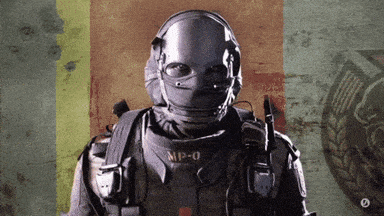
A/N: Lemme talk to you for a moment…
My new masked crush. Heart and coochie go brrrrrrrrrrrrr
Post has not been checked for grammar corrections / Not requested :D
Cannon Information:
Nikto (Neeek-toe) is a Operator in Spetsnaz for the Allegiance faction which is within the KorTac Organization. Basically hes a contractor for the contractors. Its cannon that he has facial scarring which is why he wears a mask. Not a turn off for me ah ha ha
So he isn’t necessarily a good guy like the 141 guys (even though now they’re considered war criminals I suppose) but he’s also not a bad guy. In summary, man does what he gets hired to do.
Anyways, after going AWOL in October 2022 from the Russian contracting military group he resurfaced in June 2023 (also the introduction of his character in the game). He resurfaced being the leader of a military group which was overtaking the Dutch city of Vondel.
On the Official Wiki he is only given two paragraphs of biography. You can read it here -> https://callofduty.fandom.com/wiki/Nikto
Also mentioned on the page [ for the COD Mobile universe ] is that theres cannon beef between Ghost and Nikto!! Yes, you heard me right. So on the wiki it is mentioned that Nikto was working for a guy named Templar. Whom is betrayed and killed by Ghost. Then when Ghost went after everyone else in the helicopter he shot Nikto. It was thought that Nikto died from the shot but he didnt….
Nikto reappears when he takes a group of people hostage and records a video explaining that the world has failed them and has left people like (Nikto) to beg and then fight over the scraps. Price (yes Price) tries to convince Nikto to let the hostages go and to basically chill out but Nikto wins by blowing up the building. With the hostages inside.
Okay maybe he has beef with all of 141… and is kinda a bad guy I can change him
SO then time passes and Nikto reappears again seeking a gun deal with a dude named Gunzo. Gunzo asks Nikto “why a man wanted on every continent, doesnt have guns” this pisses Nikto off. Nikto replies with “i dont need guns” then proceeds to buy the guns from Gunzo. Then Nikto gasses the fuck out of Gunzo and his men with Nova Gas. Nikto explains to Gunzo that the world is failing blah blah. He then goes on to brag about how he doesnt need a gas mask to breath like everyone else because hes that edgy and then he just executes Gunzo. We can fix him
Nikto disappears again only to reappear flying a F-85B Bullshark and leading a military riot. He then orders a attack on Prices convoy (video below) and basically down their helicopter. In the video below you can see small arms fire, an RPG, and then a finishing shot. Which was shot by Nikto’s aircraft. Okay maybe he is bad, we can fix him ?
Which you can watch here -> https://youtu.be/dDaCTCu82t0
youtube
In game bio from MW, CODM, and MW2
It is referenced in his bio MW and CODM that he has acute dissociative disorder. Which according to WebMD
“Dissociative disorders involve problems with memory, identity, emotion, perception, behavior and sense of self. Dissociative symptoms can potentially disrupt every area of mental functioning. Dissociation is a disconnection between a person’s thoughts, memories, feelings, actions or sense of who he or she is.”
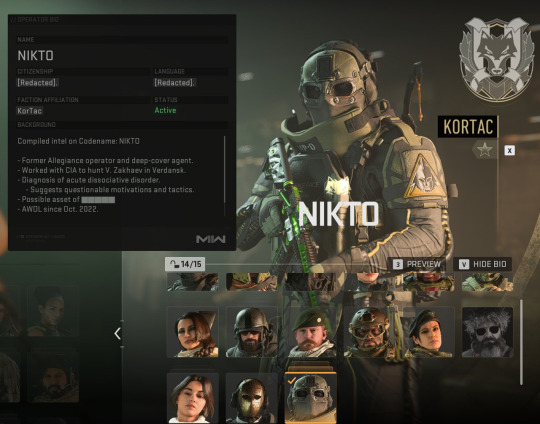
Which is explained to be from when he was tortured by Mr. Z. That event is also where he got his facial scarring from. Although he is Russian; in current MW2 timeline his nationality and language is [ REDACTED ]. I was looking around on the internet for why and Reddit believes its due to current world current events/tension. Rewording to: we can accept and love him. I dont think we can fix him.

I don’t expect this post to get a lot of attention but for those who like it my requests are fully open ❤️
i will definitely be posting more Nikto content and what I think Nikto looks like and how he acts.
Thank you for reading! -Kiv
#cod nikto#nikto x reader#call of duty x reader#character introduction#ghost x reader#konig x reader#simon ghost riley#konig mw2
1K notes
·
View notes
Text
A few months after arriving, she said, she was raped by the man who wrote the letter of invitation that had gotten her out of the war zone.
“She was sleeping and he woke her up and roughly dragged her into his room,” says Olga Udovichenko, whom Svetlana later approached for help at the Volunteer Help Center for Refugees from Ukraine in Haifa. “She suffered deeply from both the war and the rape — but here she could barely get any assistance from the authorities. Instead of help she encountered a maze of bureaucracy and lost any motivation she had to hold the man to account and seek justice.”
The Russian invasion of Ukraine in February 2022 is estimated to have killed more than 40,000 civilians and displaced up to 30 million more. As the war surpasses 300 days, 17.7 million Ukrainians around the world need humanitarian help and protection, according to the United Nations.
Svetlana is one of over 47,000 Ukrainians — the vast majority of them women — who traveled to Israel since the start of the invasion but who are not eligible for citizenship under Israel’s Law of Return, according to Israel’s Welfare Ministry. Of these, only approximately 15,000 currently remain in Israel, with the rest having chosen to leave. Not a single Ukrainian fleeing the war has been accorded refugee status by Israel.
A Times of Israel investigation has documented cases of rape, sexual harassment, workplace exploitation and other abuses faced in Israel by these women, many of whom have had their homes destroyed and lost their livelihoods. At least one of the women’s lives ended in death by suicide.
Many of these abuses remain at best under the radar of the authorities or at worst willfully ignored, leaving the victims in a cycle of violence and poverty that only deepens the trauma they have endured to date. The perpetrators remain free to commit further crimes.
325 notes
·
View notes
Text

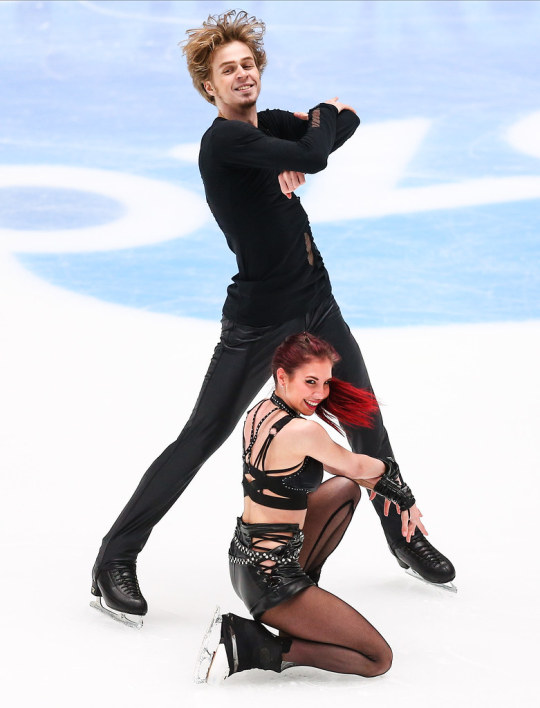

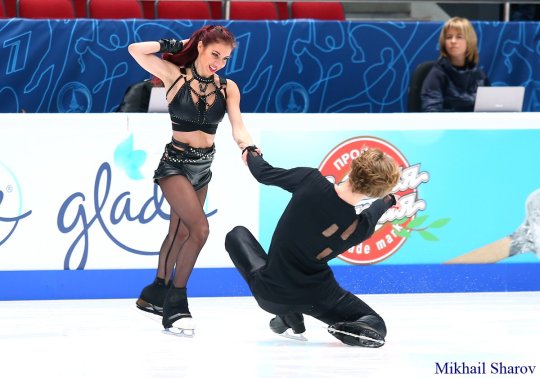
Diana Davis and Gleb Smolkin's rhythm dance costumes at the 2022 Russian Nationals. They skated to Boom Boom Pow by the Black Eyed Peas and Bom Bidi Bom (from Fifty Shades Darker) by Nick Jonas and Nicki Minaj.
(Sources: 1, 2, 3 and 4)
#Diana Davis#Gleb Smolkin#Figure skating#Ice dance#Black Eyed Peas#Nick Jonas#Nicki Minaj#Fifty Shades Darker#Midnight Blues#Street Dance Rhythms#Russia#Davis Smolkin#2021–2022#2022 Russian Nationals
17 notes
·
View notes
Text
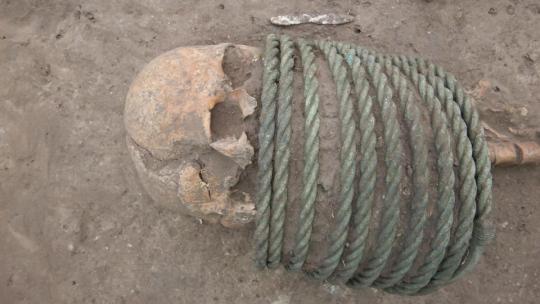
Skeletons With Rings Around Their Necks Uncovered at Ancient Cemetery In Ukraine
The discovery of a cemetery in Ukraine from a millennium ago has revealed axes, swords, jewelry and, unexpectedly, buckets around the feet of some of the dead.
Archaeologists in Ukraine have discovered a 1,000-year-old cemetery whose dead were buried with weapons, jewelry and, curiously, buckets around some of their feet.
The 11th-century cemetery is located about 50 miles (80 kilometers) south of Kyiv. Of its 107 graves, "most of the identified burials were deposed in wooden coffins," Vsevolod Ivakin and Vyacheslav Baranov, both archaeologists at the National Academy of Sciences of Ukraine, wrote in a paper they presented at the annual meeting of the Archaeological Institute of America, which was held Jan. 4-7 in Chicago.
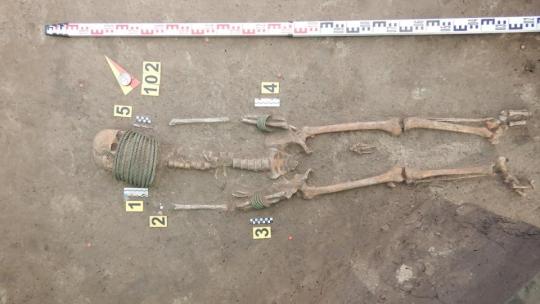
The cemetery's dead include both men and women. Some of the men were buried with weapons, such as axes, spearheads and swords, Ivakin and Baranov wrote. A few of the women were buried with elaborate neck rings, which "are found only on necks in female burials and were apparently a kind of social marker," in this region at the time, Baranov said in an email. Some of the people were buried with wooden buckets at their feet, which may have been part of funerary rituals. Other sites that have buckets within burials have been found in the region.
The archaeologists also found a stone altar, as well as bracelets, beads and the remains of food offerings, such as chicken bones and eggshells, among other artifacts. The altar could have been used for Christian or pagan rituals, or possibly both.
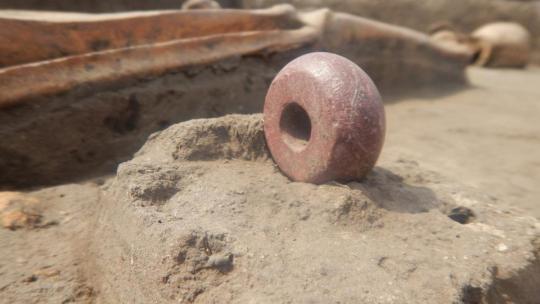
Some of the artifacts are similar to those found in the Baltic, hinting that some of the people buried in the cemetery might have come from that region to serve in the militaries of the rulers of Kyiv, such as Volodymyr the Great (who reigned from 980 to 1015) and Yaroslav the Wise (who reigned from 1019 to 1054), the archaeologists noted. The territories that Volodymyr the Great ruled stretched to the Baltic region.
At the time the cemetery was in use, people in Ukraine were converting to Christianity, the researchers said. This included Volodymyr the Great, who left behind his pagan roots and was baptized around 987 before his marriage to Anna, the sister of the Byzantine emperor Basil II.
The researchers excavated the cemetery between 2017 and 2022. The ongoing Russian invasion of Ukraine, however, has paused many excavations in Ukraine, including this one, the archaeologists said.
By Owen Jarus,
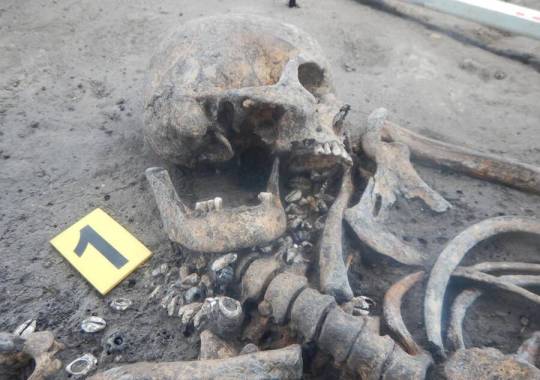
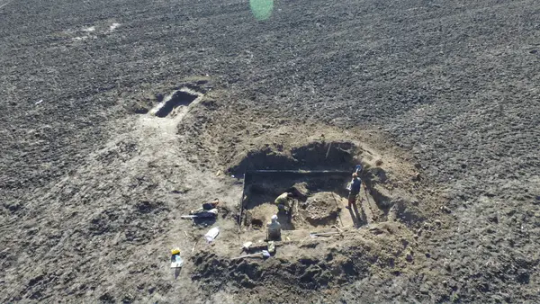
#Ukraine#Skeletons With Rings Around Their Necks Uncovered at Ancient Cemetery In Ukraine#ancient grave#ancient tomb#ancient cemetery#ancient artifacts#archeology#archeolgst#history#history news#ancient history#ancient culture#ancient civilizations
306 notes
·
View notes
Text
Only these kind of people from Russia can be called "good Russians" without sarcasm.
Listen to what he says.
Most Russians, even liberal ones, even those you see rallying for Navalny, would skin this guy for the things he says - like not agreeing with the occupation of Crimea in 2014, or Russia choosing the fascist road, or that both nations - Ukraine and Russia - will win in this ONLY if the war ends on Ukraine's terms.
PS: a surgeon from Moscow disagreed with Russian occupation of parts of Ukraine in 2014, and in 2022, when Russia started a full scale war, he left to live in Estonia and now comes to Kyiv frequently to do surgeries for Ukrainian soldiers wounded in battles.
#ukraine#russia#actual good russian#russian culture#russian invasion#russia is a fascistic state#russia is a terrorist state
237 notes
·
View notes
Text
Six months into the Russian occupation of the Ukrainian city of Kherson, in September 2022, the director of Liza Batsura’s college arrived at the dormitory where Batsura lived and told the students to pack up their things: They were going to Crimea. If the students refused, they would be put in the basement, Batsura said, speaking through a translator. The director gave no further explanation.
The next evening, they were taken to a camp called “Friendship” in Crimea, which was occupied by Russia in 2014. Although she couldn’t have known it at the time, Batsura—now 16 years old—was one of almost 20,000 children the Ukrainian government estimates have been deported or forcibly displaced to Russia. Only 388 have been returned.
Initially, the prospect of a couple of weeks by the sea didn’t sound so bad. But Batsura quickly began to realize that that wouldn’t be the case. The food was terrible, the days were long, and the children were pressured to sing Russian songs, including the national anthem, which made her very uncomfortable.
Foreign Policy is unable to independently verify Batsura’s account, but her experience closely tracks with the findings of investigations by the United Nations as well as researchers at Yale School of Public Health and other human rights groups who have documented a “systematic” effort to relocate and reeducate thousands of Ukrainian children over the course of the war. She also recounted her story to Reuters as part of an extensive investigation into the deportations.
Batsura was one of five Ukrainian teenagers who visited Washington last month with representatives of Save Ukraine, a Ukraine-based nonprofit that helps to rescue Ukrainian children from Russia and the territories it occupies. They stoically recounted the stories of their abductions again and again for journalists, members of Congress, and attendees at public events.
It was the group’s first visit to Washington. Batsura felt like she was in a movie, she said.
With long limbs and round cheeks, the teenagers filed into the conference room of a Washington-based nonprofit with their minders from Save Ukraine for an interview with Foreign Policy. Once the Wi-Fi password had been secured and the bathroom located, they began to tell their stories.
They were teenagers like any other you’d see hanging out with friends at a cafe or shopping mall. Yet they were also victims of Moscow’s large-scale deportation of Ukrainian children—a potential war crime and the reason that the International Criminal Court (ICC) issued arrest warrants for Russian President Vladimir Putin and the country’s children’s rights commissioner, Maria Lvova-Belova, in March 2023.
Like Batsura, they all hail from regions of eastern Ukraine that were quickly occupied by Russian forces in the early days of the war. They recount being coerced or forced, sometimes at gunpoint, to go with Russian forces, and they were taken to schools and summer camps where they were held for several months and faced pressure to accept Russian citizenship.
In many instances, Ukraine’s most vulnerable children have borne the brunt of Russian deportation. Before the war, Ukraine had one of the highest rates of child institutionalization in Europe, with more than 100,000 children living in residential institutions. The vast majority have living parents but were placed in institutions because of poverty, difficult family circumstances, or because the child had a disability, according to Human Rights Watch.
The deportations have been carried out in plain sight. Early in the war, Putin signed a decree making it easier for Ukrainian children to be adopted and to be given Russian citizenship. Lvova-Belova herself claims to have adopted a teenager from the besieged Ukrainian city of Mariupol, and she has spoken publicly about her efforts to Russify him. In November, a BBC investigation found that a 2-year old girl who went missing from a children’s home in Kherson when she was just 10 months old had been adopted by 70-year-old member of the Russian parliament, Sergey Mironov.
Lvova-Belova has made a number of visits to institutions holding Ukrainian children, including to a college in the occupied Ukrainian city of Henichesk, where Batsura had been transferred from Crimea and placed in a culinary arts program.
The dormitory where Batsura was placed was freezing cold at night, she said, and the teenagers were forbidden to close the doors to their rooms. Russian troops patrolled the halls.
Lvova-Belova offered the children 100,000 rubles, roughly $1,000, and the opportunity to study at a college in Russia on the condition that they remain there. Batsura refused. Officials tried to find her a foster family, and she feared she would be sent to a remote region of Russia and would never be able to return to Ukraine.
For eight months while she was in Russian custody, Batsura had been unable to contact her mother, but she learned through a friend that her mother was working with Save Ukraine and applying for a passport so that she could travel to Russia and collect her.
With the border to Russia closed since the invasion, families face a daunting overland journey through wartime Ukraine, traveling into Poland, Belarus, and then Russia and—in Batsura’s case—down into occupied Ukrainian territory.
In some instances, children are turned over to their relatives without too much difficulty once the family members arrive to collect them, but the Russian authorities have also been known to present obstacles, said Olha Yerokhina, a spokesperson for Save Ukraine. The organization has helped families retrieve 240 children to date.
Officials at the school told Batsura that the journey was too arduous and that her friend was giving her false hope that her mother would ever arrive. “I didn’t believe them, and I kept telling myself that ‘No, my mom can do it, my mom will come,’” she said.
In May 2023, Batsura was rescued by her mother and now lives with her in Kyiv, where she is working with psychologists to process her experience. She is back in school and describes her hobbies as writing poems and making TikTok videos.
I asked her, given the atrocities that Putin has been accused of committing in Ukraine and during his presidency, how she felt about the fact that it was experiences like hers that had led the ICC to issue an arrest warrant for the Russian leader.
Yerokhina, who acted as our translator, interrupted to say that because she was rescued after the court order was issued, Batsura had likely missed the news about the ICC arrest warrant.
After Yerokhina explained the court’s decision, Batsura said, “It’s just.”
148 notes
·
View notes
Text
"russia just invaded ukraine vs israel committing a genocide in palestine”
yeah just invaded.
yeah it a fair war of two relatively the same military powers.
yeah one side never said that the other never existed and shouldn’t exist now.
yeah one side is not targeting civilian infrastructure en masse.
yeah it’s just a conflict and not a continuation of a hundred-year conquest of an imperial power to destroy a nation.
it’s not like one side has killed at least 10 million people in the space of the last century while specifically targeting this nation in particular.
it’s great that you all read about palestinian history - this is a right thing to do and one of the ways to decolonise your own knowledge- but maybe pick up a timothy snyder or serhiy plokhy book and read when russians started killing ukrainians. you would be surprised that it didn’t start either in 2022 or 2014, its been going on FOR CENTURIES.
wording matters. check whether your country recognises holodomor as a genocide. if yes, read about it. if not, read about it as well.
and then check what constitutes a genocide and how both of this tragedies are genocides: of ukrainian people by russia and of palestinian people by israel.
212 notes
·
View notes
Text
U.S. and European officials have begun quietly talking to the Ukrainian government about what possible peace negotiations with Russia might entail to end the war, according to one current senior U.S. official and one former senior U.S. official familiar with the discussions.
The conversations have included very broad outlines of what Ukraine might need to give up to reach a deal, the officials said. Some of the talks, which officials described as delicate, took place last month during a meeting of representatives from more than 50 nations supporting Ukraine, including NATO members, known as the Ukraine Defense Contact Group, the officials said.
The discussions are an acknowledgment of the dynamics militarily on the ground in Ukraine and politically in the U.S. and Europe, officials said.
They began amid concerns among U.S. and European officials that the war has reached a stalemate and about the ability to continue providing aid to Ukraine, officials said. Biden administration officials also are worried that Ukraine is running out of forces, while Russia has a seemingly endless supply, officials said. Ukraine is also struggling with recruiting and has recently seen public protests about some of President Volodymyr Zelenskyy’s open-ended conscription requirements.
And there is unease in the U.S. government with how much less public attention the war in Ukraine has garnered since the Israel-Hamas war began nearly a month ago, the officials said. Officials fear that shift could make securing additional aid for Kyiv more difficult. [...]
Officials also have privately said Ukraine likely only has until the end of the year or shortly thereafter before more urgent discussions about peace negotiations should begin. U.S. officials have shared their views on such a timeline with European allies, officials said.[...]
"Manpower is at the top of the administration’s concerns right now,” one said. The U.S. and its allies can provide Ukraine with weaponry, this person said, “but if they don’t have competent forces to use them it doesn’t do a lot of good”[...]
The Biden administration does not have any indication that Russian President Vladimir Putin is ready to negotiate with Ukraine, two U.S. officials said. Western officials say Putin still believes he can “wait out the West,” or keep fighting until the U.S. and its allies lose domestic support for funding Ukraine or the struggle to supply Kyiv with weapons and ammunition becomes too costly, officials said. [...]
The Biden administration has spent $43.9 billion on security assistance for Ukraine since Russia’s invasion in February 2022, according to the Pentagon. A U.S. official says the administration has about $5 billion left to send to Ukraine before money runs out. There would be no aid left for Ukraine if the administration hadn’t said it found a $6.2 billion accounting error from months of over-valuing equipment sent to Kyiv.[...]
A Gallup poll released this week shows decreasing support for sending additional aid to Ukraine, with 41% of Americans saying the U.S. is doing too much to help Kyiv. That’s a significant change from just three months ago when 24% of Americans said they felt that way. The poll also found that 33% of Americans think the U.S. is doing the right amount for Ukraine, while 25% said the U.S. is not doing enough.
Public sentiment toward assisting Ukraine is also starting to soften in Europe. [...]
Administration officials expect Ukraine to want more time to fight on the battlefield, particularly with new, heavier equipment, “but there’s a growing sense that it’s too late, and it’s time to do a deal,” the former senior administration official said. It is not certain that Ukraine would mount another spring offensive.
3 Nov 23
198 notes
·
View notes